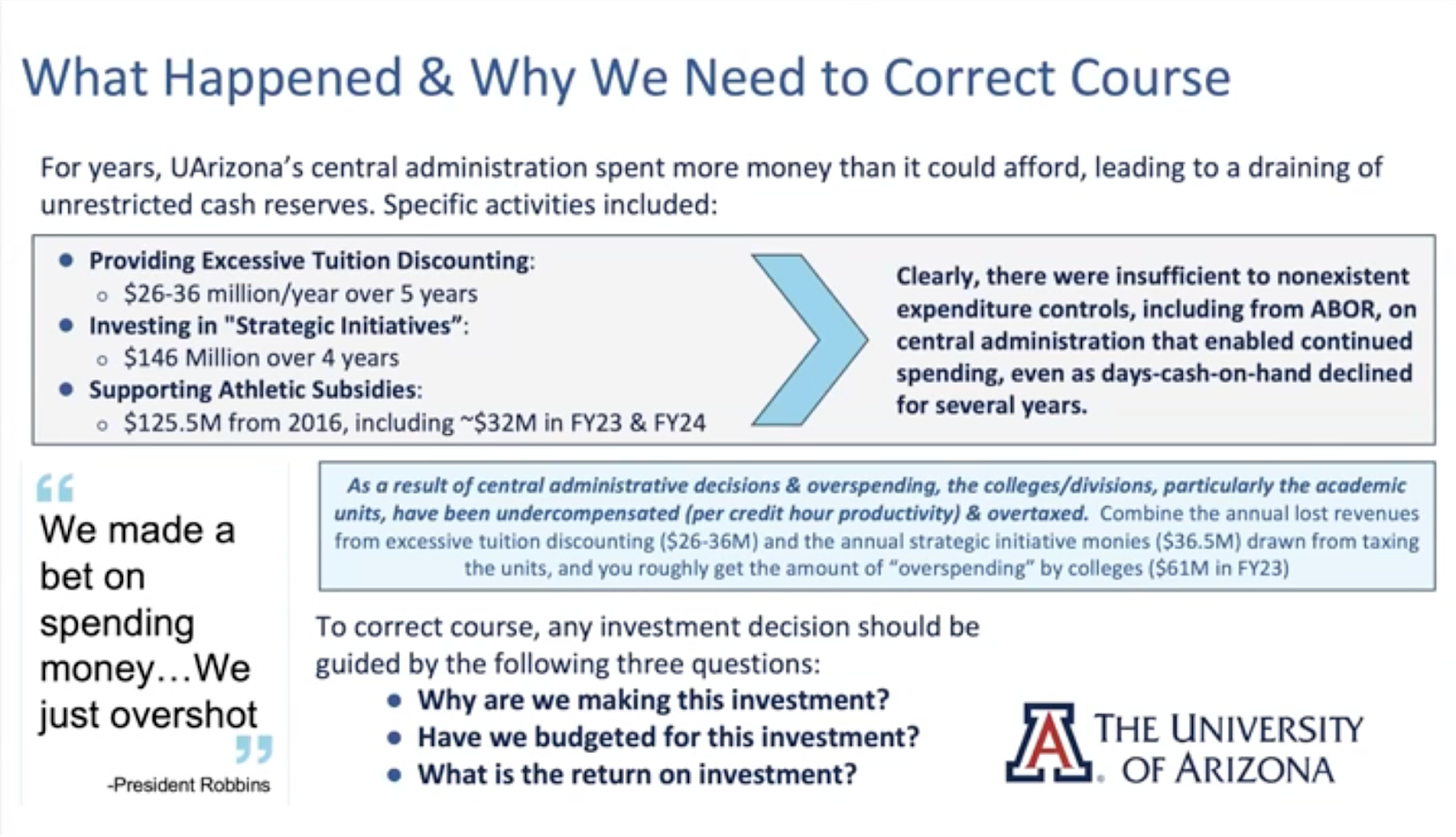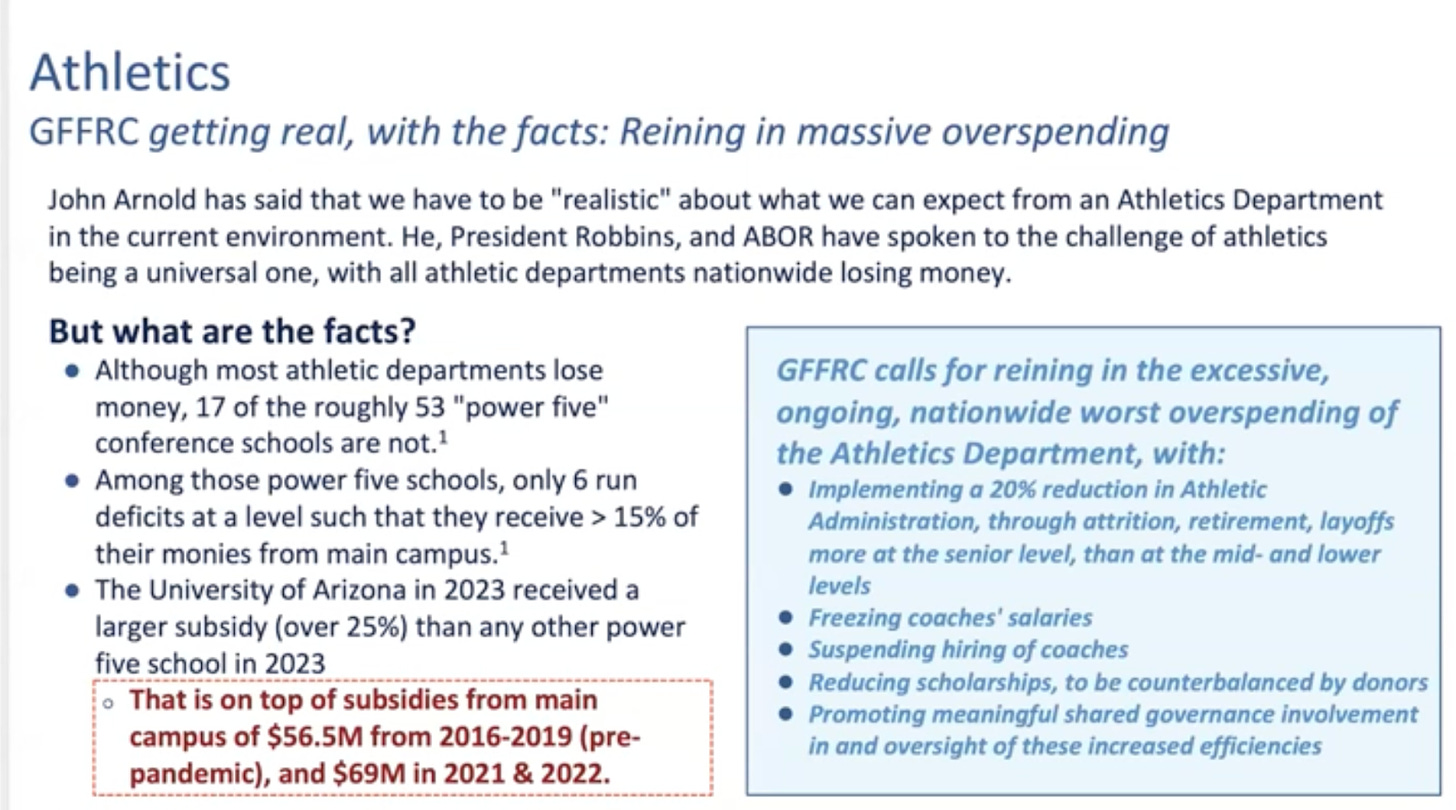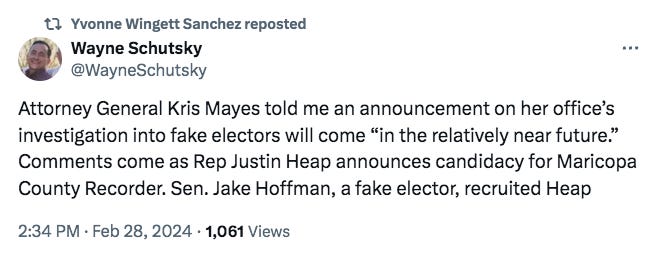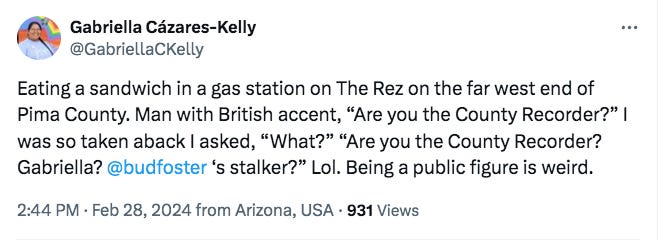The Daily Agenda: Setting the UA record straight
UA leaders are being called out for conflicting and false statements ... Faculty review shows UA athletics is the worst in the country for overspending ... Big changes coming to zoning laws.
If there’s one thing everyone involved in the University of Arizona financial crisis can agree on, it’s that there’s been no shortage of misinformation since the November announcement of the school’s multimillion-dollar budget deficit.
The dollar amount of that deficit has changed more than once. So have the causes of the deficit and the steps the UA said it would take to correct the situation. Administrators have blamed the media for the confusion and have stressed during multiple meetings the need to “set the record straight” and clarify what they really meant to say.
But finally, it seems like the jig is up, as the people in charge are being called out for their inability to stick to the facts.
Earlier this week, Gov. Katie Hobbs condemned the higher-ups at the UA for again providing conflicting information to her office, the press and the public, demanding an in-person meeting with UA President Robert C. Robbins and regents.
“It is crystal clear that the handling of the University of Arizona crisis is heading in the wrong direction,” Hobbs wrote in a Monday news release. “New facts have come to light that once again show the Arizona Board of Regents failed in their oversight role and highlight a university leadership that was clueless as to their own finances.”
Hobbs’ request comes days after a presentation by the school’s General Faculty Financial Recalibration Committee that addressed issues with the UA’s proposed financial action plan and challenged several statements by UA leaders.
We wrote about athletic department spending last week, so we were especially interested in what they had to say about Regent Fred DuVal’s claim that the UA athletic department’s financial challenges are a “universal problem.”
The committee presented their most findings during a faculty senate meeting last week and the United Campus Workers of Arizona showcased that information in an Instagram post titled “Putting out the gaslight: UA admin’s misinformation about the financial crisis.”
Turns out, the problem in athletics isn’t universal at all. The committee looked at 53 comparable athletic departments and found 17 of them, or about one-third, don’t have a deficit.
They also found that the UA subsidizes its athletic department a lot more than other schools, to the tune of 25% or more, versus most other schools’ 15% contribution.
They’re also not anywhere near universal when it comes to debt. The UA athletic department reported a 43% increase in debt during the first five years of Robbins’ tenure at the UA, with other Pac-12 schools averaging out at just 6%. Across all Division 1 schools in the country it was 7%. That’s not even in the same ballpark, so to speak, as the increase at the UA.
“What we hear is that we need to be realistic about what we can expect of athletics departments and that they all lose money. What are the facts?” said committee member Gary Rhoades. “We are the worst in the country in overspending in athletics.”
The UA’s main campus has bailed out the athletic department repeatedly over the years, according to the committee, which reported $56.5 million in bailouts between 2016 and 2019. It forked over another $69 million between 2021 and 2022.
“Compared to other Pac-12 schools, UA’s athletics debt and bailouts indicate gross failures of financial management,” the post said. “In spite of UA Athletics’ history of abject failures, over the last few months we’ve heard story after story about new hires, new contracts, and new promotions at Athletics.”
The GFFRC has recommended freezing coaches’ salaries and suspending the hiring of coaches, but it might be too late for that. More than a dozen new hires –– many of which come with hefty salaries –– were announced in recent weeks, despite a campus-wide hiring freeze.
In the past six weeks, the athletics department has hired a new director, football coach and several assistant coaches and support staffers for the team, while also giving a 28% pay raise to head basketball coach Tommy Lloyd.
The school is also still pushing ahead with its plans to debut a new club-level sport (women’s hockey) in the fall, and in this case, the new sport also means a new facility. When the season kicks off in the fall, the team will play out of the Tucson Convention Center, but eventually plans to call the new Mosaic Quarter Iceplex home when it opens.
It’s unclear what the UA’s financial contribution to the construction and operation of the Iceplex will be, but the facility’s website features renderings of the building’s exterior and rink emblazoned with UA logos and that sort of branding doesn’t come cheap.
The last time we wrote about sports-related expenses, a reader pointed out that not all the money spent on athletics comes from the UA’s coffers, with donors contributing big bucks to supplement salaries and help fund capital improvements.
We asked the athletics department for the total amount of athletic department salaries covered by donations but didn’t get a response by our deadline, with an athletics department spokesman telling us that this was a “unique ask” that they haven’t yet had to address.
We’ll report back when we get an answer. And while we want to be able to trust the information that the UA gives us, that’s becoming increasingly difficult as this situation evolves. And we’re not the only ones who feel this way.
“We continue to be extremely disappointed in our senior leadership’s misrepresentations, back peddling, and inability to tell workers what they want to hear. We also continue to question the legitimacy of ABOR in light of its chronic mismanagement, impulsive choices, and unelected statuses,” said Graduate and Professional Student Council member Jeremy Bernick. “We want real accountability going forward. And we want union voices and leadership steering this conversation forward within the institution.”
Tie breaker: The Arizona attorney general may weigh in on whether the Tucson City Council acted within the law when they set a sales tax election for this summer, the Tucson Sentinel’s Dylan Smith reports. State law says these types of elections must be held in November, but the city argues the city charter allows them to do it whenever they like. State Sen. Rosanna Gabaldon asked Attorney General Kris Mayes to issue an opinion within 30 days. The city appears to be using the sales tax election to pressure the other members of the Regional Transportation Authority, essentially saying if the city doesn’t get its fair share, then they’ll leave RTA Next.
Financial fallout: Several major donors stopped their financial support of the Humane Society of Southern Arizona after the scandal over hundreds of small animals that were sent from the humane society in San Diego to their counterparts in Tucson, only to end up being fed to reptiles, KVOA’s Chorus Nylander reports. It looks like the humane society is down about $108,000 and about 150 new donors.
Layoffs coming: The UA is going to lay off staff in phases, starting with senior management, but they won’t do furloughs, Arizona Public Media’s Danyelle Khmara reports. They hope to have a budget set by mid-April, John Arnold, the UA’s interim CFO said. From there, they’ll look at whether each college can meet their spending targets. If not, they may reduce more positions within the college.
Downtown digs: The Rio Nuevo board said two downtown businesses can take over the old Crescent Tobacco Shop, which closed last year, KGUN's Sean Newgent reports. The board, which is in charge of the downtown sales tax district, gave the green light to Johnny Gibson's Downtown Market and Highwire Cocktail Bar to make a grab-and-go bodega, once they finalize an agreement with the building's owner.
Zoning battle continues: The Arizona Starter Home Act is close to passing and it would bring a raft of changes to zoning laws as legislators grapple with the housing crisis, Capitol Media Services' Bob Christie reports. The bill targets local zoning laws that lawmakers from both parties blame for the lack of small, affordable homes. Other bills would allow developers to convert commercial properties to residential and shorten the public hearing process, among other changes.
Traveling showers: The City of Tucson recently bought a trailer for its mobile shower program to help unsheltered people, This is Tucson’s Elvia Verdugo reports. The city offers hot water, soap, towels and assorted hygiene items. They also offer clean clothes. Those are often in short supply, so donations are welcome. A shower may seem like a small thing, but volunteer Zion Alderette, who spent some time without a home in his 20s, said they can make a world of difference.
“When I wasn’t able to shower, I tried to go to the courthouse to file my divorce and I wasn’t even allowed to go into the courthouse. The guards said I couldn’t go in,” he says. “Everybody has a life, everybody has to do something and this is one thing that overcomes one barrier.”
20%: The General Faculty Financial Recalibration Committee’s proposed cuts to athletic department administration staffing through attrition, layoffs, retirement and more, starting at the senior level then moving to mid and lower-levels.











Thanks for the context about UA Athletics funding, it does seem like UArizona is an outlier in many ways.
According to the 2/19/24 news release about Coach Lloyd's contract extension, donor funds are covering the cost of his pay increase. Athletics should know very well what funds come from where as I don't believe they can be commingled with state/tuition funds, because there are restrictions on how different funds can be spent (donor funds have far fewer restrictions).
It does beg the question though of why Athletics isn't made to prioritize repaying loans to the university instead of giving out pay raises and hiring staff.
Thank you for your continued reporting on the UA financial crisis. This situation displays the importance of multiple journalistic eyes on a situation. Ellie Wolfe of the AZ Star works hard to give detailed reports. But the prominence that the Star's editors gave to the Jim Click office confab left me questioning how much Click's ad revenue influenced the decision to cover a bunch of people who clearly didn't know what they were talking about and the decision regarding the placement of the news article. I read the Tucson Agenda every morning to learn what's going on in Southern Arizona.